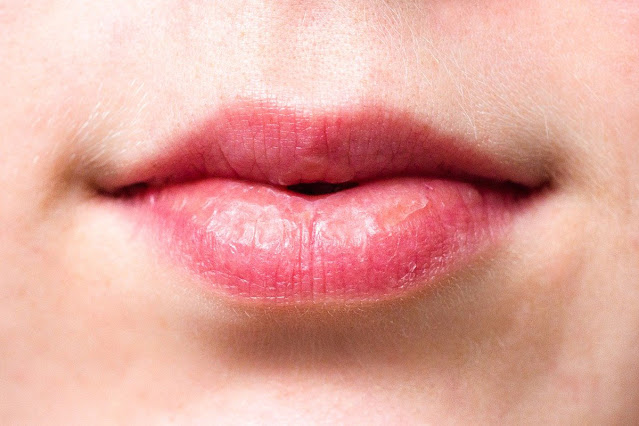 |
| 9 Reasons Why Your Mouth Corners Crack |
Cracked mouth corners, also called angular cheilitis, is a
condition that occurs due to inflammation of patches in the corners of your
mouth. This makes these areas cracked, red, and swollen. Angular cheilitis
happens for various reasons from nutrient deficiencies to autoimmune diseases.
Not knowing why the cracks develop and if they were ever going to disappear
might be a constant source of anxiety. Knowing why these cracks appear makes
this condition a little less scary.
Angular cheilitis is not like chapped lips that usually
occur due to a lack of moisture. Mouth corners crack because of a fungal
infection. Since your mouth has its own ecosystem, it contains different types
of bacteria, viruses, and fungi. This includes a type of fungus called Candida albicans.
It is one of the most common types of fungus living on your skin (mouth,
vagina, gut) and its overgrowth can provoke an infection called candidiasis.
Saliva collects at the corners of your mouth and can dry the
area out which results in cracks. When you lick mouth corners to relieve the
irritation, you’re actually helping yeast get into open wounds. It creates a
breeding ground for yeast to grow.
Table of Contents
9 Common Causes Of Angular Cheilitis
Cracked mouth corners don’t have one specific cause but some
things can make you more prone. Here are nine causes of angular cheilitis:
1. Certain Medications
Certain medications, for instance, the acne drug
isotretinoin or chemotherapy can lead to skin irritation and dryness that often
results in angular cheilitis.
2. Age
Actually, elderly people are more prone to angular cheilitis
as they often have dry mouth and a weaker immune system. This makes it more
complicated for them to combat infections. Plus, age-related changes around the
mouth can increase the risk of angular cheilitis. Older adults lose structural
support around the mouth, and their mouth corners tend to turn down, which
creates folds in those corners.
3. Autoimmune Diseases
Angular cheilitis can be a sign of Sjogren’s syndrome.
Sjorgen’s syndrome is an autoimmune disease in which the immune system attacks
the mucous membranes and moisture-secreting glands of eyes and mouth.
Autoimmune disorders like lupus, Crohn’s disease, and ulcerative colitis, can
also provoke regular angular cheilitis.
4. Dry Mouth
Dry mouth or xerostomia is another common cause of cracked
mouth corners. People with this issue have a higher risk of angular cheilitis.
5. Braces And Other Oral Appliances
Any type of oral appliance (including braces) you have in
your mouth can change the anatomy of your mouth that can cause cracked mouth
corners.
6. Down Syndrome
Down syndrome is accompanied by muscular hypotonia which
means a person has a lower than normal muscle tone. It can cause people with
Down syndrome to keep their mouths open and let their tongues protrude, which
actually irritates the corners of the mouth.
7. Weather
Yes, the weather can also affect the skin around your lips.
It’s known that dry and cold weather can cause skin dehydration and irritation.
It also makes your lips extra dry and can cause angular cheilitis.
8. Lack Of Nutrients
According to scientists, anemia is a condition caused by a
lack of iron that has been linked to angular cheilitis. Lack of iron can lower
the immune system which makes you more prone to infections as well as angular
cheilitis. Also, the lack of B vitamins and zinc can provoke this issue due to
the fact that these nutrients also play a key role in maintaining a healthy and
strong immune system.
9. Dehydration
Since lack of fluids in the body is linked to dry mouth it
can also provoke cracked mouth corners. People with some diseases like
untreated diabetes are especially prone to frequent urination and overall
dehydration and thus are more likely to get angular cheilitis.
Angular Cheilitis Treatment
Before starting any treatment you need to talk to your
primary care physician to get a correct diagnosis. Your doctor may prescribe a
topical form of corticosteroid to reduce inflammation and antifungal cream to
eliminate fungal overgrowth.
But if you experience angular cheilitis and can’t see your
doctor now, you may use a 1% hydrocortisone cream (corticosteroid) along with
an antifungal medication for Candida albicans. Keep in mind that using only a
topical corticosteroid can make your cracked mouth corners worse since this
medication reduces the immune system in the area where you apply it. This can
make any infection get worse.















This article gives the light in which we can observe the reality. This is very nice one and gives in depth information. Thanks for this nice article.
iv vitamin therapy los angeles beverly hills ca